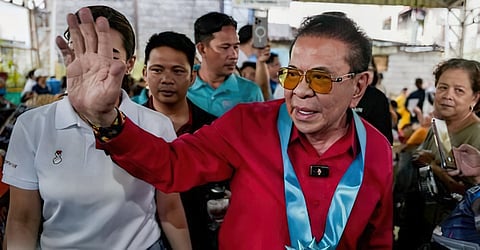
- NEWS
- the EDIT
- COMMENTARY
- BUSINESS
- LIFE
- SHOW
- ACTION
- GLOBAL GOALS
- SNAPS
- DYARYO TIRADA
- MORE

Senatorial candidate Luis “Manong Chavit” Singson has vowed to eliminate red tape if he is elected in the 2025 midterm election, citing it as a major barrier to foreign investments in the Philippines.
Singson, a billionaire and chairman of the LCS Group of Companies, pointed out that bureaucratic delays are one of the main reasons foreign investors hesitate to set up shop in the country.
Manong Chavit, as he prefers to be called, has expanded his businesses abroad, saying he was forced to invest in Gangwon, South Korea due to the persistent red tape in the Philippines. There, he established an economic zone through his Korean company, LCS Group Korea.
“The red tape in the Philippines is a huge deterrent for investments. It’s one of the reasons I took my investments to South Korea,” Singson said. “If given the chance, I will work to eliminate these bureaucratic hurdles and make the Philippines more business friendly.”
“The wellness center I am planning to establish, my second economic zone in Korea, lies on a four-hectare beachfront land that I purchased for about $100 million. This will be the home of a manufacturing plant for beauty and health products,” Singson said in an exclusive interview on DAILY TRIBUNE’s online show Usapang OFW on Tuesday.
He said the facility would feature a training center, and if elected to the Senate his platform would include bringing Filipinos there to train and eventually work at a health products factory he plans to establish.
“Students who want to study and train are open to go there. They are assured of jobs in Korea once they finish their studies and training. Also, we are currently working with the Korean government to make the entry visa-free. That’s still under negotiation,” he said.
In August 2021, a report by The Korea Economic Daily Global Edition said Singson’s LCS Group agreed to join a $1.7-billion resort development in South Korea, the first firm from a Southeast Asian country to invest in a property project in Northeast Asia.
This was after Singson signed a memorandum of understanding to invest and participate in the project with the Gangwon Province government, East Coast Free Economic Zone Authority, Korea Investment & Securities Co., and Hyundai Asset Management Co., with the LCS Group pouring in $100 million.
The project cost, as much as 2-trillion won ($1.7 billion), includes the construction of resorts and ocean complexes in Donghae City, about 260 kilometers east of Seoul, according to the report.
Unrealized ecozone
Singson said he relocated his investments to South Korea because his plans to put up an ecozone in the Philippines did not materialize due to the intricacies of putting up such a huge business here, plus the offending government red tape.
“Here in the Philippines, it’s very difficult to establish an economic zone. When I tried to do it before, it wasn’t approved in the Senate. My son, a congressman at the time, also filed it, but it wasn’t approved in the Senate either. In South Korea, it’s so easy to set up an economic zone. What a waste; I should have brought it here. It’s the red tape that needs to be removed,” Singson said.
He said foreign investors should be continuously encouraged to set up factories in the country’s ecozones.
“I also operate a cigarette and tobacco factory in Ilocos Sur, which brings enough revenue to our coffers, and another manufacturing plant for electric trikes in Batangas. That is what we need. Also, we lack airports even though we have more than 7,000 islands. I will also transfer here my car engine factory from Korea,” he said.
“If they approve the proposal of an added economic zone, it would be easy to relocate those businesses. I think the ease of doing business remains futile here,” he maintained.
As of June 2024, the Philippines, through the Philippine Economic Zone Authority, manages 427 economic zones nationwide that are home to 4,382 locator companies.
